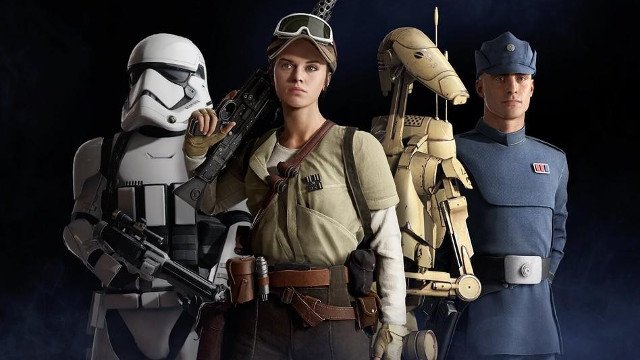In an ideal world, loot boxes would not exist in retail releases. After you’ve parted ways with your cash, you should rightly have access to all of its content at launch. You’ve paid the same entry fee as everyone else, and you shouldn’t feel like you’re missing out on portions of the game because you’ve refused to hand over even more money.
But this isn’t an ideal world, and loot boxes are so lucrative for game publishers that they’ve now become the primary method of shoving microtransactions into their games. Recently we’ve seen the likes of Forza Motorsport 7, Middle-earth: Shadow of War and the upcoming Star Wars Battlefront 2 placed under the microscope for their use of them, but their prevalence in gaming is only going to accelerate in the coming years, and right now this presents a big consumer issue in the industry.
Whereas microtransactions would previously simply allow players to purchase the in-game items and cosmetics they wanted right out of the gate, the randomized nature of loot boxes ensures that they now never know what they’re going to get when they fork out their cash. This means that if they really want to get their hands on a particular costume, weapon or emote, they’re going to have to keep earning or purchasing more loot boxes. This can leave players rightfully unwilling to pay extra money feeling left behind, which becomes even more of a pertinent issue when loot boxes provide items or abilities that grant their owners in-game advantages.
Also: Star Wars Battlefront 2’s Loot Boxes is Shaping up to Be Pay-To-Win With its Loot Boxes
Unfortunately, as we’ve previously seen with the furore surrounding on-disc DLC, pre-order bonuses and horse armor, we can’t do much about the rise of loot boxes other than continue to complain about them until we inevitably give up and move onto something else. For context, Activision Blizzard made over $3.6 billion from in-game content sales in 2016 alone, so even if we all go on about it until we’re blue in the face, loot boxes are going to keep on existing regardless. However, while publishers will take advantage of our collective complacency and loot boxes will continue to exist as a result, we should still encourage the laying down of certain boundaries to ensure that they don’t sink too far into anti-consumer territory. With that being said let’s take a look at some ground rules that provide both realistic expectations for publishers, along with ensuring that future games wouldn’t be ruined by the inclusion of these microtransactions:
They should offer no gameplay advantages whatsoever

Loot boxes should not provide advantages for those who purchase them. I shouldn’t buy a game only to find that those who have spent extra money are sailing ahead of me, solely by virtue of their willingness to funnel more money into a $60 release. I’ve seen people debating what constitutes a “pay-to-win” game, but the definition is pretty simple from where I’m sitting: if I can spend real money in order to gain an in-game advantage that will affect other players, then that game is pay-to-win. No matter how small that advantage may be, if I can effectively buy my way to victory in a game then that is totally unacceptable and completely unfair to other players.
The Star Wars Battlefront 2 beta has unfortunately hinted towards DICE’s sequel following this path, with the game’s purchasable loot crates offering Star Cards that provide in-game abilities such as damage amplifiers and ability cooldown reductions. Players can also find crafting materials in these loot crates which allow existing Star Cards to be upgraded, effectively ensuring that players who unlock more loot crates have a greater chance of decking themselves out in high-end gear. I went into further detail regarding the game’s planned microtransactions earlier this week, but suffice to say that unless this system receives more than a few substantial tweaks prior to the game’s November launch, it isn’t looking great.
I’m really looking forward to Star Wars Battlefront 2 and I’ve enjoyed playing the beta a considerable amount, but if it is set to include purchasable gameplay advantages, then that will significantly reduce my interest in it. Why would I want to invest time into playing a competitive online game when the leaderboards will inevitably be topped by people who have paid to be there? The beta is currently dominated by players with access to better Star Cards, and while this would be irritating in and of itself, at least they’ve actually earned these items by playing the game. When the full game launches and anyone can simply buy access to these powerful Star Cards, those who want to keep up will have to splash out more money or risk being left behind. This is NOT a way to ensure that your competitive multiplayer game retains its player base, and while microtransactions may pay off greatly for publishers in the short term, in the long run players such as myself who refuse to pay for gameplay advantages will drop off from the game sooner rather than later.
They should be easily obtainable without having to buy them

Loot boxes exclusively containing cosmetic items are the most preferable form of loot box, given that they offer no gameplay advantages other than affording players the opportunity to customize their in-game appearance. However, there are many players who find great value in cosmetic items, and for those individuals they’re far from inconsequential additions to a game. As a result, loot boxes should be relatively easy to obtain regardless of whether or not they solely contain cosmetic items, making them easy enough to earn even if you don’t funnel extra money into a game.
I understand those who don’t particularly care about cosmetic items (I count myself among them) and who would therefore not feel incentivized to pay a blind bit of notice to loot boxes solely containing them. However, one need only glance at the excited discussion surrounding new skins in the likes of Overwatch to understand that there are plenty of players who do care about cosmetics, and their enjoyment of a game is just as important as anyone else’s.
They shouldn’t be intrusive for those who don’t care about them

I don’t want to buy your loot boxes. If you’ve inserted loot boxes into your game, I’ll earn them like I would any other unlockable item, and if it becomes apparent that their inclusion is detrimental to the rest of the game then I’ll stop playing. I know many other people feel the same way, and for folks like us loot boxes shouldn’t be an intrusive element of a game we’ve already paid for.
Loot boxes that serve as a dangling carrot to convince players to spend less time playing a game and more time entering their credit card details are unacceptable. If I’ve bought a game, I don’t want it to repeatedly remind me that my initial purchase wasn’t enough. I don’t want to be reminded that I’m lagging behind the competition because I haven’t reached into my back pocket enough, nor do I want to feel as though pumping hours into a game won’t be as rewarding as pumping cash into it.
Forza Motorsport 7 recently featured loot boxes that included items referred to as “mods,” which allowed players to modify elements of races in order to earn themselves more CR, its in-game currency. This system was outlined by Ars Technica, who branded the game “pay-to-earn,” with the complaints now leading to Turn 10 actively working towards improving it. Though it can often feel like the consumer is shouting from the bottom of a mountain in the gaming industry, this goes to show that if loot boxes prove to be too intrusive and enough people label it as such, it can have a real impact. Hopefully this continues to be the case in the future, as seeing great video games sullied by loot boxes isn’t a trend that anyone other than the most stubborn of publishers wants to see continue.







